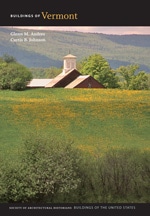In 1799 Dr. John Sargent, the first president of the Rutland County Medical Society, commissioned this hipped-roof, two-story Federal farmhouse. Certainly its L-plan, which presents two symmetrical facades is old enough, since there are two similar examples within Pawlet alone. But the vernacular rendition of Asher Benjamin's Venetian door design, where the sidelights are exact but the fanlight is wonderfully stretched to shelter a broad door, seems part of a later remodeling. Given its subtle differences in proportion and detail from the other entrances, window surrounds, and corner pilasters on the rest of house, this could date to 1820. Sargent's son Warren followed in his father's footsteps as a physician, studied at the new Castleton Medical Academy, and established his practice in a new Greek Revival home in Pawlet village nearby. The farm passed to a member of the Leach family of Rupert in 1831 and became a prosperous dairy farm in the twentieth century, which accounts for the collection of late-nineteenth-and twentieth-century barns behind the farmhouse. Today the house with the striking entrance is a Mettowee Valley landmark. Everyone knows the “Sargent House,” even in a town that is replete with two-hundred-year-old farmhouses.
You are here
John Sargent House
If SAH Archipedia has been useful to you, please consider supporting it.
SAH Archipedia tells the story of the United States through its buildings, landscapes, and cities. This freely available resource empowers the public with authoritative knowledge that deepens their understanding and appreciation of the built environment. But the Society of Architectural Historians, which created SAH Archipedia with University of Virginia Press, needs your support to maintain the high-caliber research, writing, photography, cartography, editing, design, and programming that make SAH Archipedia a trusted online resource available to all who value the history of place, heritage tourism, and learning.









